Letter published in the Montreal Gazette, on October 2, 2023
Laurence Guénette, Chantal Ide, Nelly Marcoux and François Saillant are members of the Indigenous Peoples’ rights working group at the Ligue des droits et libertés in Montreal.
This week marks the fifth anniversary of the election of the Coalition Avenir Québec government in 2018. Over the past few days, we have also marked the National Day of Truth and Reconciliation, the anniversary of the publication of the Viens Commission report in 2019, and the anniversary of Joyce Echaquan’s death in 2020. And Oct. 4 marks the National Day of Action for Missing and Murdered Indigenous Women and Girls.
These commemorative days remind us that there is much work to be done to address the colonial foundations of Quebec’s relationship with Indigenous Peoples and the impacts of centuries of dispossession, racism and paternalistic policies.
Moreover, after five years of the Legault government, we must reckon with the fact that the CAQ’s approach and positions have marked a significant step back in what is already a complex process of relationship-building.Unfortunately, there is no shortage of examples to illustrate this reality. One is the government’s inaction with respect to the implementation of the United Nations Declaration on the Rights of Indigenous Peoples, despite two motions passed by the National Assembly in October 2019 and October 2020.
Another example is the Quebec government’s legal challenge, before the Supreme Court of Canada, of bill C-92, a federal law aiming at affirming and implementing the inherent right to self-government of First Peoples in matters of child and family services.
We could also mention the development and adoption — that is, the imposition — of laws and regulatory frameworks that profoundly impact Indigenous Peoples, without consideration for their realities, perspectives and recommendations (for example, Bill 96, modifying Quebec’s Charter of the French Language in 2022; or, more recently, Bill 32, with its stated objective of establishing a cultural safety approach within the health and social services network).
These examples point to an approach characterized by poor listening and a profound lack of regard for the rights, concerns and aspirations of Indigenous Peoples.
Two common threads underpin these actions. On the one hand, the government’s wilful blindness to the existence and impacts of systemic racism purports to justify its lack of consideration for the demands and strategies put forward by Indigenous communities, leaders and experts to secure a thriving future for their members, families, communities and nations. On the other hand, the refusal to exercise a strong leadership to ensure Indigenous self-determination is respected and implemented — a refusal that, in some cases, amounts to obstruction — continues to stand in the way of the full realization of this fundamental collective right.
The CAQ is not solely responsible for this denial and inertia and for their far-reaching consequences. Over the years, between negligence, obstruction and failing solidarity, the National Assembly has not been able to define, in collaboration with Indigenous Peoples, a vision for the future in which the self-determination and the flourishing of Indigenous and non-Indigenous societies are considered on an equal footing and not framed as mutually exclusive — a vision that respects and honours our common and distinct needs and aspirations in the context of nation-to-nation relationships.
Many resources are available to guide the process of building such a vision, starting by tapping into all the knowledge held within the Indigenous communities and nations of this territory. We can also count on numerous reports and analyses from Indigenous and non-Indigenous commissions and organizations that clearly explain the political, social, cultural, economic and environmental challenges that stand in the way of the full exercise of Indigenous Peoples’ rights; these also identify necessary changes to address barriers at all levels.
In the face of the lack of political will and strong moral leadership from government and elected officials, it is up to the collective to put the fight for Indigenous self-determination and against systemic racism on the table, again and again; to relay and amplify the demands of Indigenous communities and nations in such a way as to make them impossible to ignore; and to reject any vision of our collective future that is incompatible with a profound respect for the rights and self-determination of Indigenous Peoples in Quebec.
